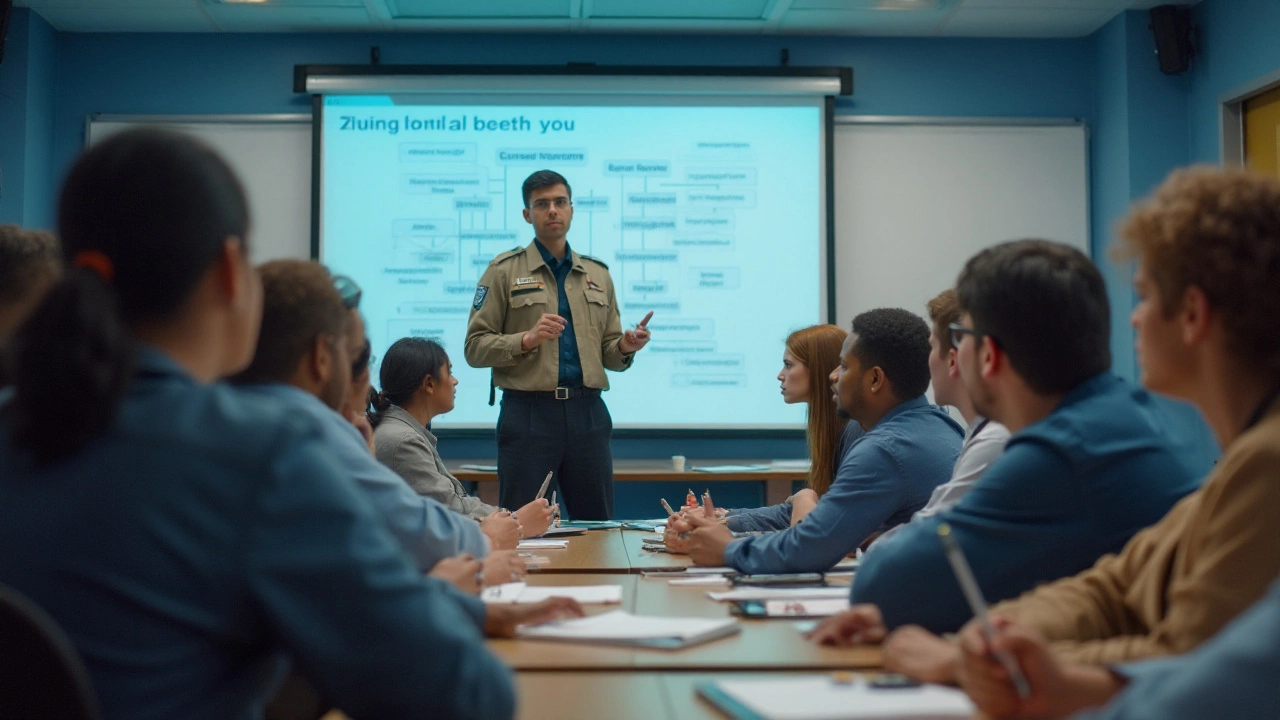Breaking into federal government jobs can feel overwhelming, yet it remains one of the most sought-after career paths due to its benefits and career stability. The avenues to explore within this vast sector are plenty, but knowing how to start is crucial.
In this article, we aim to demystify the process of landing a federal job, guiding you through each necessary step with clear explanations and useful tips. From crafting a strong resume to mastering the federal interview, we will provide you with all the tools needed for a successful application.
This journey demands patience and preparation, but with the right moves, your efforts will land you in a promising federal role.
- Understanding Federal Job Applications
- Creating the Perfect Federal Resume
- Navigating the USAJOBS Platform
- Preparing for Federal Interviews
- Leveraging Networking and Resources
Understanding Federal Job Applications
Landing a job within the federal government isn't a walk in the park, but understanding the application process is your first major step. The federal hiring process is distinct from the private sector and even other governmental systems. It's designed to ensure fairness and equal opportunity, which means it follows a specific procedure that can at times seem cumbersome. Yet, once you get a grip on the basics, it's quite manageable. Most federal jobs are posted on the USAJOBS website, which acts as the primary portal. Here, you will find a wide range of government careers that might align with your skills and aspirations.
Firstly, it's important to recognize that federal job announcements follow a specific format, providing detailed information about the position. Each job listing is comprehensive, outlining duties, qualifications, salary, and the application deadline. A thorough read is needed, as this will help you tailor your application to meet the specific needs of the role. A unique feature of federal applications is the requirement of undertaking an assessment questionnaire. This is typically part of the initial application process and is designed to evaluate your suitability for the position based on self-reported proficiencies.
A typical job application also requires a federal-style resume, which is typically longer and more detailed than its civilian counterpart. You will need to list detailed job histories, including hours worked per week, and provide precise start and end dates (day, month, year) for each position. Don't be shy to include related volunteer work as it's regarded highly by federal hiring managers. Additionally, consider using the 'Job Preview' feature on USAJOBS to get personal insights into what the role demands.
It's crucial to keep track of application deadlines. Missing out on a time-sensitive role simply because you were late can be disheartening. Always set reminders and make a schedule. Moreover, some roles may require additional documents like writing samples, portfolios, or transcripts. Check the 'How to Apply' section of the announcement for all necessary documents. As the application deadlines approach, make sure all components of your submission are thoroughly reviewed and ready for submission.
"The only way to do great work is to love what you do," said Steve Jobs, and this resonates with the pursuit of a federal job. Commitment to public service and dedication to the mission of the federal institution are great motivators. Seek roles that align with your values and skill sets. The federal government doesn't just offer jobs; it offers careers that contribute to the greater good and the service of the nation. With patience and thorough preparation, you can successfully navigate the federal job application landscape and land a job that might change your life or the lives of others.
Creating the Perfect Federal Resume
Crafting a federal resume is both an art and a science, requiring a blend of precision, clarity, and extensive detail often unfamiliar to those accustomed to civilian job applications. Unlike their private sector counterparts, resumes for federal jobs are typically much longer, sometimes spanning three to five pages. This is due to the nature of federal job listings which demand comprehensive descriptions of your work history, responsibilities, and accomplishments. The key to success lies in tailoring your resume to specifically fit the requirements of the job announcement, ensuring you address each qualification the position entails.
Incorporating keywords from the job description is crucial, as the federal hiring system utilizes automated systems like resumes for initial shortlisting. Every skill and experience mentioned should be backed by concrete examples from your previous roles, effectively showcasing your expertise and suitability for the role. It is vital to provide context for your achievements, so quantify them with numbers and statistics to illustrate the impact of your work. This habit not only lends credibility but offers a clear picture of your professional competency.
Detail is everything; a successful federal resume should include information that extends beyond a typical resume such as full job history spanning 10 years, including job titles, start and end dates, hours worked per week, and salary. For candidates transitioning from the military or private sector, it’s important to translate military experience or technical jargon into easily understandable language which demonstrates your capacity for contributing to public service. This strategy allows those unfamiliar with military terms or specific technical languages to appreciate your potential as a valuable asset to the government workforce.
In a conversation with experts from the Office of Personnel Management, they emphasized the importance of tailoring each resume to the specific job announcement.
"A resume is not a one-size-fits-all document. Carefully study the job announcement and ensure your resume mirrors the desired qualifications,"they advised. Visual structure is also vital—utilizing clear formatting and logical headings assists both human readers and Applicant Tracking Systems (ATS) in navigating through your document effectively, making your qualifications easily discernable.
Equally, consider including a comprehensive skills section, potentially in a bulleted format, where you emphasize your proficiency in key areas related to the job. This feature acts as a quick-reference guide for hiring managers, helping them immediately identify whether you meet the critical technical and soft skills required for the post. Including specific, measurable achievements can also enhance this section. For example, rather than noting "Improved efficiency," you could state "Implemented process changes that increased departmental efficiency by 20% over six months." This approach is not only informative but makes your application stand out in a pool of qualified applicants.

Navigating the USAJOBS Platform
USAJOBS is the gateway to discovering a wealth of opportunities within the U.S. federal government, serving as the main job board for federal employment positions. Successfully navigating this platform is crucial for securing a federal job. It's more than simply submitting applications; it's about making the most out of its features to stand out in a competitive field. Initially, it may seem daunting with its structured processes and requirements, but with a bit of practice and knowledge about its intricacies, it can turn into a valuable ally.
To begin, it’s essential to create a comprehensive profile. A well-detailed profile acts as your foundation and showcases your skillsets, experiences, and preferences directly to potential employers. Most applicants tend to overlook the power of optimizing their profile, thinking a generic one-size-fits-all approach might work. However, tailoring your profile with relevant keywords and accurate descriptions aligned with a specific job can significantly increase your chances of being noticed. This is particularly important given the automated systems that frequently perform initial screenings.
The USAJOBS Help Center advises applicants to “be thorough in your approach with both experience and education sections. The more expansive and complete, the better.”
Once your profile is ready, exploring the search functionalities effectively is the next critical step. The platform allows you to refine your search using various filters such as location, salary range, agency, and job announcement. Utilizing these search tools efficiently will narrow your options down, enabling you to concentrate on positions that truly match your skills and interests. It’s also beneficial to save searches and set up email alerts for new job listings that align with your criteria. This proactive approach minimizes missed opportunities and keeps you informed in real-time about relevant postings.
Crafting a Solid Application Package
Securing a job goes beyond the initial application submission; maintaining an impeccable application package is crucial. This includes your federal-style resume, which should be detailed and possibly extend beyond the conventional two pages. Federal resumes require more in-depth information, such as hours worked per week and specific duties handled for each position. On top of the resume, be prepared with supporting documents such as transcripts or veterans' preference claims if applicable. These attachments can be uploaded directly on the platform, and having them pre-organized ensures you can apply swiftly once you find the right job.
| Feature | Benefits |
|---|---|
| Email Alerts | Stay updated on new job opportunities |
| Saved Searches | Quickly access tailored job listings |
One often overlooked aspect is the follow-up process. After submitting your application, regularly check the status on your USAJOBS dashboard. This feature provides key updates such as referred, not referred, or selected, and it’s vital in understanding where you stand in the hiring process. If referred, consider reaching out to the contact listed on the job announcement for further insights or to express continued interest. This proactive behavior showcases confidence and enthusiasm, traits highly valued in government careers.
Preparing for Federal Interviews
The federal interview process is a distinctive experience compared to those in the private sector. It often involves behavioral interviews, where candidates are assessed on past behavior as predictors of future success. Preparing for federal interviews involves not just knowing your resume but thoroughly understanding the role you've applied for. This is a pivotal moment, where your knowledge of how government sectors work and the specific agency you're aiming to join becomes essential. Expect to be asked how your skills align with the agency’s mission, requiring you to demonstrate your readiness to contribute effectively.
An essential strategy in preparing for a federal interview is using the STAR method—Situation, Task, Action, Result. This technique helps in structuring your responses to behavioral questions. For instance, if asked about a time when you had to resolve a conflict, you should clearly describe the situation, the task required, the action you took, and the result of your actions. This method provides a comprehensive framework for answering questions, ensuring that nothing is left vague or ambiguous. Practicing with this method can provide clarity and conciseness in your responses.
Researching the agency is another cornerstone of a successful federal interview preparation. Candidates should familiarize themselves with the agency's objectives, recent news, and current challenges. Such knowledge shows a genuine interest and might differentiate you from other candidates. Diane Hudson, a renowned federal career coach, suggests that being able to articulate how you can address the agency's current issues is a powerful way to make your interview memorable.
"Understanding the agency's challenges and having a plan to address them makes candidates stand out," she says.
Mock interviews can be incredibly beneficial for federal job interviews. They not only help alleviate anxiety but also give you the chance to practice longer, coherent responses under pressure. Consider seeking feedback from someone experienced in federal hiring processes. Their insights can provide a reality check about your preparedness levels. A little-known fact is that federal interviews might also test your adaptability and problem-solving skills, reflecting a shift towards evaluations that gauge real-world effectiveness and not just technical skill sets.
Another vital tip in the realm of federal interviews—oftentimes, interviews are part of the highly competitive phase 2 after initial application reviews, especially for high-demand federal jobs. Hence, preparing ahead by brushing up on these advanced interview skills is as important as setting the alarm prior to your scheduled interview time. Remember, the federal jobs landscape values individuals who can mesh team collaboration with independent expertise.
No interview preparation is complete without considering the possible format. The federal interview can be conducted in various formats such as panel interviews with multiple interviewers or even technical components for certain positions. You may encounter both situational questions and those that test your factual knowledge of agency regulations or legislations. Preparing for these can often require a combination of knowing current regulations, keeping updated with recent legislative changes pertinent to the job role, and reviewing the position's core competencies as listed on the job announcement.

Leveraging Networking and Resources
When it comes to landing a job within the federal government, networking is more powerful than you might think. Developing connections with individuals who are already part of this ecosystem can open doors that seem firmly shut. Attend career fairs, workshops, and seminars organized around government careers, as these events typically host current and former federal employees keen to share their experiences. Remember, each interaction is not just about asking for a job, but rather building genuine professional relationships. Establishing these bonds over time can lead to insider information about upcoming job openings or tips on how to improve your application.
Additionally, it’s crucial to tap into the myriad of resources available to those aspiring to join federal positions. Websites like USAJOBS.gov not only list the vast array of available positions but also offer tutorials and advice on perfecting your resume and meeting the specific demands of a federal job application. There are forums and online groups, such as GovLoop, which serve as a virtual community for people interested in government opportunities, sharing advice, mentorship, and sometimes exclusive job openings. Engaging with these platforms can vastly improve one's understanding of the inner workings of government recruitment.
If you believe in the power of human stories, listening to others' journey into federal positions can greatly inspire and instruct. As Pericles once said,
"Time is the wisest counselor of all."This rings true as some seasoned professionals willingly recount their failures and successes. They might have insights into how political climates affect hiring trends within the department you're interested in, or the best times of the year to look for openings, thus sharpening your strategic approach.
In the constantly evolving landscape of federal jobs, staying informed is as critical as preparation. Maintain a habit of regularly following relevant news sources, government press releases, and updates from agencies you’d like to work with. If possible, volunteer for federal agencies or work in related fields to gain firsthand experience. Universities often partner with government bodies for research projects, providing a collaborative platform for networking and growth. By keeping yourself updated and engaged, you only increase your chances of finding the perfect career fit within the federal government.
